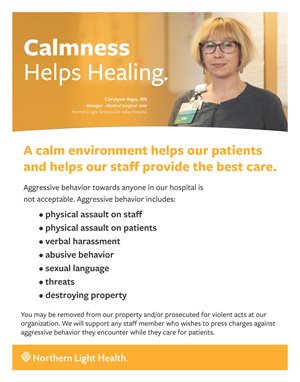Patient & Visitor Communication

Best practices for communicating behavior expectations to patients and visitors
- Use Plain Language: Avoid jargon, technical terms, or complex medical terminology. Opt for simple and easily understandable language to ensure clarity.
- Be Respectful and Positive: Frame the expectations in a positive and respectful manner. Emphasize the importance of maintaining a safe and supportive environment for everyone involved, including patients, visitors, and staff.
- Focus on Collaboration: Encourage a collaborative approach by emphasizing that adherence to behavioral expectations benefits everyone's well-being and enables the delivery of quality care.
- Be Specific and Concrete: Clearly outline the expected behaviors or behaviors that are prohibited. This helps patients and visitors understand exactly what is expected of them and reduces ambiguity.
- Multilingual Communication: Consider the linguistic and cultural diversity of the patient and visitor population. Provide translated materials or utilize interpreter services to ensure effective communication for non-English speaking individuals.
- Display Signage: Place visible signage in key areas that outline the behavioral expectations.
- Train Staff in Communication: Provide training to staff members on effective communication strategies when discussing expectations of behavior with patients and visitors. Staff should be prepared to handle challenging situations and defuse conflicts with empathy and professionalism, as well as feel comfortable seeking support and reporting any incidents of violence.
Communication examples & additional resources:
.jpg.aspx?width=200&height=418)

.jpg.aspx?width=300&height=400)
Vermont Hospital Association’s Model Signage for Workplace Violence Prevention: VAHHA Model Signage
Michigan Health and Hospital Association’s WPV Prevention and Safety Signs available for order: Workplace Safety Poster Request Form - MHA | Michigan Health & Hospital Association
Missouri Hospital Association’s “Healing Happens Here” Toolkit that includes examples of signage: Healing Happens Here Toolkit - MHA (mhanet.com)
Empty heading